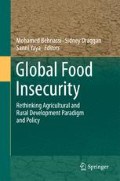Abstract
Many thinkers and activists have recognized the need for a paradigm shift within agricultural practices (Wirzba 2004; Shabbir et al. 2009). Religion has often been hypothesized as a source that can provide an alternative to the dominate paradigm (Oelschlaeger 1994; Leopold 1990). It has been argued that religious beliefs, practices and institutions can usher in a new paradigm by providing new discourses, creation stories and ideal communities, as well as providing social capital and new practices (Oelschlaeger 1994; Peterson 2005; Taylor 2007; Wirzba 2004). Through my historic and ethnographic study of small-scale American Muslim farms in the United States, I found that religious beliefs, practices and institutions have been an integral part of these communities, providing motivation, ethics, material support, communal practices and institutions, while also creating barriers to these projects. By being involved with farms that are an important part of their religious communities and motivated in part by concerns over food security, these American Muslims have become involved with food production systems and rural environments and communities. This has led them to become involved with governmental and non-governmental programs and policy making aimed at helping rural areas or small-scale farms, as well as allowed them to learn first hand about biodiversity and changes to the environment caused by humans. Although a small-scale study, these types of farms are likely important to the future of agriculture, making it also important to learn from this project when investigating other religious groups.
Access this chapter
Tax calculation will be finalised at checkout
Purchases are for personal use only
Notes
- 1.
Conference organized by the Faculty of Law, Economics and Social Sciences of Agadir and the North-South Center for Social Sciences (NRCS), in collaboration with the German Technical Cooperation (GTZ), November 12–14, 2009, Agadir (Morocco).
References
Curtis EE (2006) Black Muslim religion in the nation of Islam, 1960–1975. University of North Carolina Press, Chapel Hill
Dannin R (2002) Black pilgrimage to Islam. Oxford University Press, New York
Fess M (1946) Mohammedan village byproduct of depression. Buffalo Courier-Express
Gomez MA (2005) Black crescent: the experience and legacy of African Muslims in the Americas. Cambridge University Press, New York
Jordan WR III (2003) The sunflower forest: ecological restoration and the new communion with nature. University of California Press, Los Angeles
Leopold A (1990) A sand county almanac. Ballantine Books, New York
Muhammad Farms. http://www.muhammadfarms.org. Cited 9 Sept 2007
Nathan J (2007) Of church and steak: farming for the soul. New York Times
Oelschlaeger M (1994) Caring for creation: an ecumenical approach to the environmental crisis. Yale University Press, New Haven
Pastured Poultry - Featured Farmers: A Heifer Project International Case Study Booklet. http://attra.ncat.org/attra-pub/pp-featuredfarmers.html#alvin. Cited 9 Sept 2007
Peterson AL (2005) Seeds of the kingdom: Utopian communities in the Americas. Oxford University Press, New York
Reckdahl K (2003) Mississippi Muslim. Best of New Orleans
Rouse CM (2004) Engaged surrender: African American women and Islam. University of California Press, Berkeley
Shabbir SA, D’Silva J, Behnassi M (2009) Final synthesis report and resolutions of the International Conference: the integration of sustainable agriculture, rural development and ecosystems in the context of climate change, the energy crisis and food insecurity.files.nrcs.webnode.com/200000031-401b441152/Final%20Sythesis%20Report.pdf
Taylor SM (2007) Green sisters: a spiritual ecology. Harvard University Press, Cambridge
Truly Living Well Natural Urban Farms. www.trulylivingwell.com. Cited 10 Feb 2010
Turner RB (2003) Islam in the African-American experience. Indiana University Press, Bloomington
White VL (2001) Inside the nation of Islam: a historical and personal testament by a Black Muslim. University Press of Florida, Gainesville
Wirzba N (ed) (2004) The essential agrarian readier: the future of culture, community and the land. Shoemaker and Hoard, Washington, DC
Author information
Authors and Affiliations
Corresponding author
Editor information
Editors and Affiliations
Rights and permissions
Copyright information
© 2011 Springer Science+Business Media B.V.
About this chapter
Cite this chapter
Finnegan, E. (2011). Cultivating Faith: The Relationship Between Islam and Sustainable Agriculture in Rural Communities of American Muslims. In: Behnassi, M., Draggan, S., Yaya, S. (eds) Global Food Insecurity. Springer, Dordrecht. https://doi.org/10.1007/978-94-007-0890-7_5
Download citation
DOI: https://doi.org/10.1007/978-94-007-0890-7_5
Published:
Publisher Name: Springer, Dordrecht
Print ISBN: 978-94-007-0889-1
Online ISBN: 978-94-007-0890-7
eBook Packages: Earth and Environmental ScienceEarth and Environmental Science (R0)

